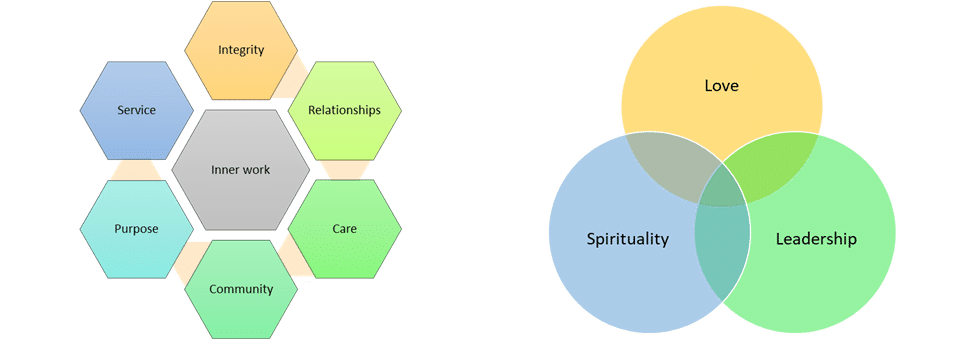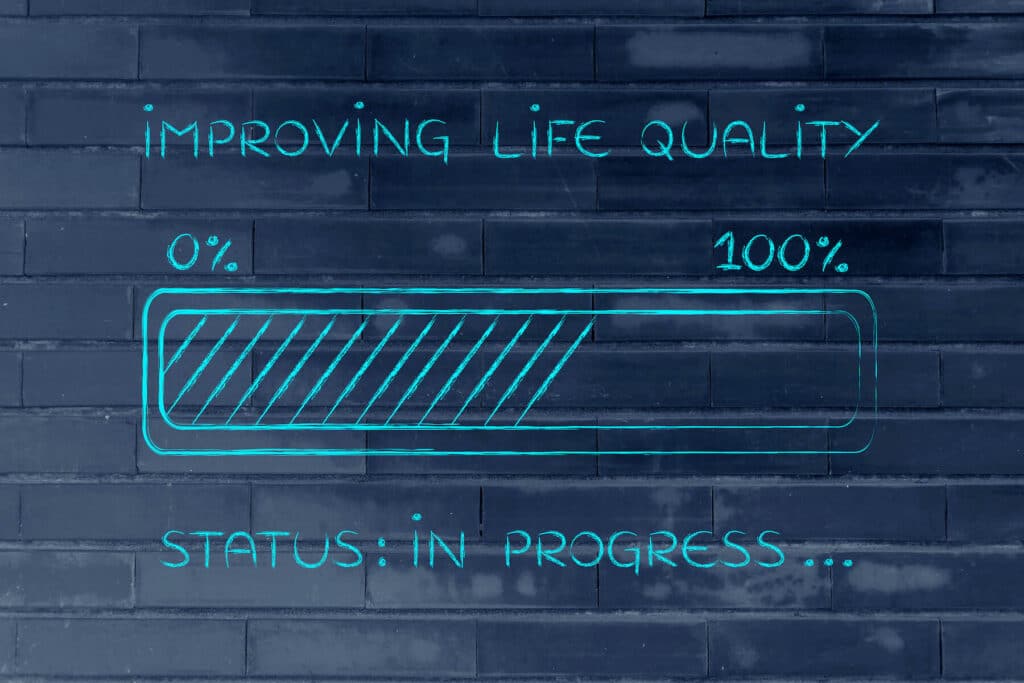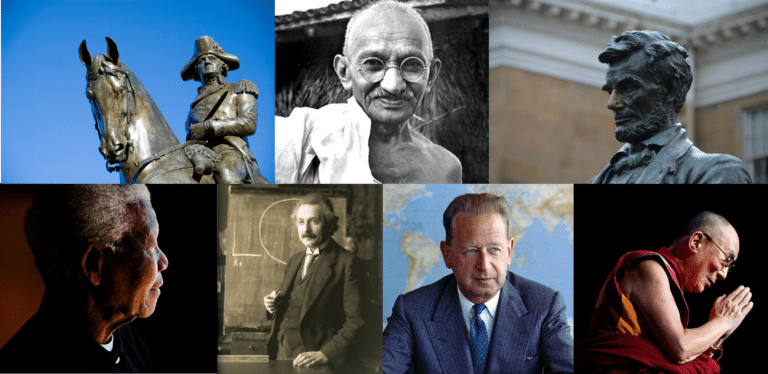Article Summary:
This article profiles several prominent historical leaders who have incorporated spirituality into their leadership, from George Washington to the Dalai Lama. (This is part of a series on spirituality and leadership.)
+++
In recent decades, with big challenges like a pandemic, climate change, global financial strains, political division, wars, and concerns about the pace of technological change, there’s been a lot of soul-searching about the roles of work and business in our lives. That’s led to growing interest not only in sustainability, conscious business, and stakeholder capitalism but also in spirituality and leadership.
In their book, The Healing Organization, Raj Sisodia and Michael Gelb report that meditation and mindfulness training are in use at companies as diverse as Aetna, Apple, Goldman Sachs, Google, Intel, and Procter & Gamble. Today, we can add Accenture, Aetna, General Mills, Microsoft, Nike, and many more.
According to author and futurist Patricia Aburdene, “The quest for spirituality is the greatest megatrend of our era.”

In previous articles, “Spirituality and Leadership—Leading with Heart and Love” and “How to Bring Spirituality into Your Leadership,” we noted that there are seven aspects of spirituality that apply to leading—and that love is an important part of the equation. See the images below.

Here we profile significant historical leaders as case studies of spirituality and leadership in action: George Washington, Abraham Lincoln, Mahatma Gandhi, Albert Einstein, Dag Hammarskjöld, Nelson Mandela, and the Dalai Lama. None of these leaders is perfect. They all have their flaws. But they’re all leaders in some capacity, and their stories are instructive and revealing.

Leadership Derailers Assessment
Take this assessment to identify what’s inhibiting your leadership effectiveness. It will help you develop self-awareness and identify ways to improve your leadership.
George Washington
George Washington (1732-1799) was the first U.S. president. He was a devoted member of the Anglican Church and served as a churchwarden several times. Though he was private when it came to his religious beliefs, prayer was a significant part of his life according to those who knew him well.
Washington cared for the poor and defended religious tolerance and freedom. He wrote and spoke often about God and Providence. Here’s Washington in his own words:
- “The propitious smiles of Heaven can never be expected on a nation that disregards the eternal rules of order and right, which Heaven itself has ordained.”
- “…a cheerful acquiescence to the Divine Will, is what we are to aim.” -letter, April 20, 1773
- “While we are contending for our own liberty, we should be very cautious not to violate the rights of conscience in others, ever considering that God alone is the judge of the hearts of men, and to him only in this case they are answerable.” -letter, September 14, 1773
- “The Man must be bad indeed who can look upon the events of the American Revolution without feeling the warmest gratitude towards the great Author of the Universe whose divine interposition was so frequently manifested in our behalf.” -letter to Samuel Langdon, September 28, 1789
Abraham Lincoln
Abraham Lincoln (1809-1865) was the 16th U.S. president and served through the Civil War. Lincoln grew up skeptical of religious dogma and institutions. Though quite private about his own beliefs, he was described as a spiritual seeker and believed in God.
Lincoln was deeply familiar with the Bible, quoting it often, and respected the beliefs of others. He attended church frequently with his wife, Mary Todd Lincoln, and he appreciated the consolation he received from ministers when his son, Willie, died. He often invoked spirituality in his speeches and letters.
Here’s Lincoln in his own words:
- “I remember my mother’s prayers and they have always followed me. They have clung to me all my life.”
- “Sir, my concern is not whether God is on our side; my greatest concern is to be on God’s side, for God is always right.”
- “…that we here highly resolve that these dead shall not have died in vain—that this nation, under God, shall have a new birth of freedom—and that government of the people, by the people, for the people, shall not perish from the earth.” -Gettysburg Address
- “With malice toward none; with charity for all; with firmness in the right, as God gives us to see the right, let us strive onto finish the work we are in; to bind up the nation’s wounds; to care for him who shall have borne the battle, and for his widow, and his orphan—to do all which may achieve and cherish a just and lasting peace among ourselves, and with all nations.” -Second Inaugural Address, 1865

Personal Values Exercise
Complete this exercise to identify your personal values. It will help you develop self-awareness, including clarity about what’s most important to you in life and work, and serve as a safe harbor for you to return to when things are tough.
Mahatma Gandhi
Mohandas K. Gandhi (1869-1948) was an Indian lawyer, anti-colonial nationalist, and apostle of nonviolence. His faith in God has been described as “total and unshakable.” Gandhi was Hindu but believed that true religion transcended specific faith traditions and denominations. He committed himself to truth (both telling and upholding it), justice, universal love, and interdependence. He was a vegetarian and disliked violence to animals.
Gandhi’s spiritual commitment was to engage in the world, not withdraw from it. His actions in the world were designed to serve his spiritual goals, and he noted that whatever power he had to address material problems like poverty came from his spiritual practices.
He thought of himself as a “practical idealist.” Gandhi led hunger strikes to stop religious violence, was imprisoned many times, and led campaigns to address poverty, women’s rights, religious and ethnic pluralism and harmony, ending the caste system of untouchability, and, ultimately, the campaign for Indian independence from British rule.
He was assassinated during an interfaith prayer meeting. People worldwide now call him, “Mahatma,” an honorific meaning “venerable” or “great-souled.” His birthday, October 2, is commemorated worldwide as the International Day of Nonviolence. Here’s Gandhi in his own words:
- “Man’s aim in life is not to add to his material possessions, but his predominant calling is to come nearer his Maker.”
- “Let me explain what I mean by religion. It is not the Hindu religion which I certainly prize above all other religions, but the religion which transcends Hinduism, which changes one’s very nature, which binds one indissoluble to the truth within and which ever purifies. It is the permanent element in human nature which counts no cost too great in order to find full expression and which leaves the soul utterly restless until it has found itself, known its Maker, and appreciated the true correspondence between the Maker and itself.”
- “When I admire the wonders of a sunset or the beauty of the moon, my soul expands in the worship of the creator.”
- “Prayer is not asking. It is a longing of the soul. It is daily admission of one’s weakness. It is better in prayer to have a heart without words than words without a heart.”
- “My religion is based on truth and nonviolence. Truth is my God. Nonviolence is the means of realizing Him.”
- “Whenever you are confronted with an opponent, conquer him with love.”
- “An eye for an eye only ends up making the whole world blind.”
- “See the good in people and help them.”
- “The day the power of love overrules the love of power, the world will know peace.”
- “Be the change that you wish to see in the world.”
- “My life is an indivisible whole, and all my activities run into one another.”
- “My life is my message.”
Albert Einstein
Einstein (1879-1955) was born in Germany and later lived in Switzerland and the U.S. He’s regarded as one of the greatest physicists in history for his theory of relativity and contributions to quantum mechanics, not to mention developing what’s been called “the world’s most famous equation.” His name is synonymous with “genius,” and scientists named one of the elements in the Periodic Table in his honor. His influence was felt by political leaders and citizens around the world.
Here’s Einstein in his own words:
- “My religion consists of a humble admiration of the illimitable superior spirit who reveals himself in the slight details we are able to perceive with our frail and feeble mind.”
- “A human being is a part of the whole called by us universe, a part limited in time and space. He experiences himself, his thoughts and feeling as something separated from the rest, a kind of optical delusion of his consciousness. This delusion is a kind of prison for us, restricting us to our personal desires and to affection for a few persons nearest to us. Our task must be to free ourselves from this prison by widening our circle of compassion to embrace all living creatures and the whole of nature in its beauty.” -letter, February 12, 1950
- “Something deeply hidden had to be behind things.”
- “There are two ways to live: you can live as if nothing is a miracle; you can live as if everything is a miracle.”
Dag Hammarskjöld
Hammarskjöld (1905-1961) was a Swedish economist and diplomat and son of a prime minister who became the youngest person in history to serve as Secretary-General of the United Nations. As the second person to hold that post, he fought to strengthen the U.N. and presided over the first U.N. peacekeeping forces. U.S. President John F. Kennedy called him “the greatest statesman of our century,” and Hammarskjöld became the only posthumous recipient of the Noble Peace Prize.
His book, Markings, which he described as “negotiations with myself—and with God,” has been called a spiritual classic. Raised Lutheran, he had a deep interest in Christian mystical teachings. He attended different churches in Sweden and New York City.
Here’s Hammarskjöld in his own words:
- “It is not we who seek the Way, but the Way which seeks us. That is why you are faithful to it, even while you stand waiting, so long as you are prepared, and act the moment you are confronted by its demands.” -from his book, Markings
- “God does not die on the day when we cease to believe in a personal deity, but we die on the day when our lives are no longer illumined by the continually reflected splendor of the wonder from sources beyond all reason.”
- “In our era, the road to holiness necessarily passes through the world of action.” -from his book, Markings
- “Faith is a state of the mind and the soul. In this sense we can understand the words of the Spanish mystic, St. John of the Cross: ‘Faith is the union of God with the soul.’”

Alignment Scorecard
When organizations aren’t aligned, it can reduce performance dramatically and cause frustration and dysfunction. With this Alignment Scorecard, you can assess your organization’s level of alignment and make plans for improving it.
Nelson Mandela
Nelson Mandela (1918-2013) was a South African anti-apartheid activist who became the first president of the modern Republic of South Africa. His mother, Fanny, was a Christian and he grew up attending Methodist schools and church, and he was baptized.
As a lawyer, he got involved with anti-colonial politics and nonviolent protests. He was arrested repeatedly but never prosecuted until 1962, when he was sentenced to life in prison. President F. W. de Klerk released Mandela after 27 years in prison. Speaking of Mandela’s long imprisonment, Archbishop Desmond Tutu said the following: “…it is like fires of adversity that toughen someone. They make you strong but paradoxically they make you compassionate, and gentle. I think that is what happened to him.”
Mandela focused on racial reconciliation and created the Truth and Reconciliation Commission with Tutu to investigate past human rights abuses. As president, he fought poverty and promoted land reform and expansion of health care services. After leaving office, he became an elder statesman of the world who fought poverty and HIV/AIDs, later earning the Nobel Peace Prize. Here’s Mandela in his own words:
- “There were many dark moments when my faith in humanity was sorely tested, but I would not and could not give myself up to despair. That way lays defeat and death.” -from Long Walk to Freedom: Autobiography of Nelson Mandela
- “Religion is one of the most important forces in the world. Whether you are a Christian, a Muslim, a Buddhist, a Jew, or a Hindu, religion is a great force, and it can help one have command of one’s own morality, one’s own behavior, and one’s own attitude.”
- “It is what difference we have made to the lives of others that will determine the significance of the life we lead.”
- “Man’s goodness is a flame that can be hidden but never extinguished.”
- “The Church was as concerned with this world as the next: I saw that virtually all of the achievements of Africans seemed to have come about through the missionary work of the Church.” (He also noted how the church was complicit in oppressing the African people.)
- “Free at last, we are all masters of our destiny. A better future depends on all of us lending a hand—your hand, my hand.”
Dalai Lama
“Dalai Lama” is the title given by the Tibetan people to the foremost leader of Tibetan Buddhism. The 14th and current Dalai Lama is Tenzin Gyatso (1935-present), who lives in exile as a refugee in India after fleeing Tibet when China invaded the country. He has been a beloved leader worldwide with a message of love, compassion, and joy.
Here’s Gyatso in his own words:
- “The whole purpose of religion is to facilitate love and compassion, patience, tolerance, humility, and forgiveness.”
- “Love and compassion are the true religions to me. But to develop this, we do not need to believe in any religion.”
- “Love and compassion are necessities, not luxuries. Without them, humanity cannot survive.”
- “Our prime purpose in this life is to help others. And if you can’t help them, at least don’t hurt them.”
- “Only the development of compassion and understanding for others can bring us the tranquility and happiness we all seek.”
- “The more you are motivated by love, the more fearless and free your action will be.”
- “Lasting happiness cannot be found in pursuit of any goal or achievement. It does not reside in fortune or fame. It resides only in the human mind and heart.” -Dalai Lama and Desmond Tutu with Douglas Abrams, from The Book of Joy

Take the Traps Test
We all fall into traps in life. Often we’re not even aware of them. Check out these common traps of living to see what’s inhibiting your quality of life and fulfillment.
Summary
These leaders from all over the world—though far from perfect and sometimes with deep flaws, as with many of us—have integrated spirituality into their leadership practices with great effect. They have influenced and inspired millions of people and left a powerful legacy.
Reflection Questions
- Which leaders inspire you?
- How so?
- How might you incorporate spirituality into your leadership?
Tools for You
- Leadership Derailers Assessment to help you identify what’s inhibiting your leadership effectiveness
- Personal Values Exercise to help you determine and clarify what’s most important to you
- Alignment Scorecard to help you assess your organization’s level of alignment

Quality of Life Assessment
Evaluate your quality of life in ten key areas by engaging with our assessment. Find your strongest areas, and the areas that need work, then plan accordingly!
Related Articles
- “On Spirituality and Leadership—Leading with Heart and Love”
- “How to Bring Spirituality into Your Leadership”
- “Spirituality and Leadership in Action–Modern Examples”
- “The Case for Love-Based Leadership”
- “How to Bring Love-Based Leadership to Your Workplace”
- “Love-Based Leadership in Action”
- (See also our series on servant leadership.)
Quotations on Spirituality and Leadership
- “One truth stands firm. All that happens in world history rests on something spiritual.” -Albert Schweitzer, physician and humanitarian
- “The greatest battles of life are fought out daily in the silent chambers of the soul.” -David O. McKay, religious leader
- “Leadership is based on a spiritual quality. The power to inspire. The power to inspire others to follow.” -Vince Lombardi, legendary football coach
- “If you want to accomplish the goals in your life, you have to begin with the spirit.” -Oprah Winfrey, media entrepreneur, author, and philanthropist

Triple Crown Leadership Newsletter
Join our community. Sign up now and get our monthly inspirations (new articles, announcements, opportunities, resources, and more). Welcome!
+++++++++++++++++++++++
Gregg Vanourek and Bob Vanourek are leadership practitioners, teachers, and award-winning authors (and son and father). They are co-authors of Triple Crown Leadership: Building Excellent, Ethical, and Enduring Organizations, a winner of the International Book Awards. Check out their Leadership Derailers Assessment or get their monthly newsletter. If you found value in this, please forward it to a friend. Every little bit helps!

